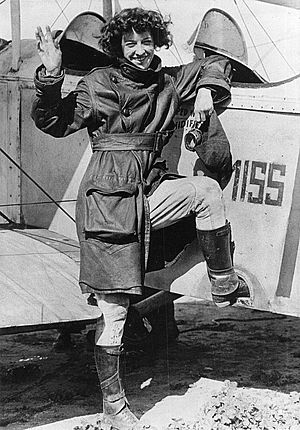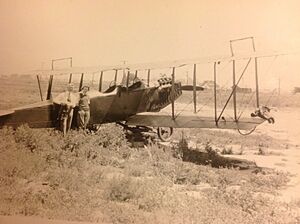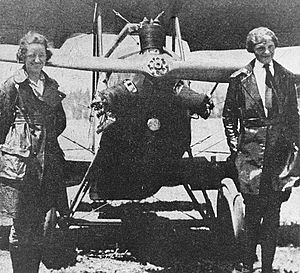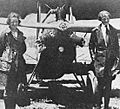Neta Snook Southern facts for kids
Quick facts for kids
Neta Snook
|
|
|---|---|

Neta Snook in 1921 at Kinner Field, California (This image courtesy Ames Historical Society).
|
|
| Born |
Mary Anita Snook
February 14, 1896 |
| Died | March 23, 1991 (aged 95) California, USA.
|
| Occupation | Aviator |
| Known for | Amelia Earhart's first flying instructor. |
| Spouse(s) | Bill Southern |
Neta Snook (born Mary Anita Snook, February 14, 1896 – March 23, 1991) was an amazing early aviator. She was one of the first women to fly planes. Neta achieved many "firsts" for women in aviation. She was the first woman pilot in Iowa. She was also the first woman student at the Curtiss Flying School. Neta even ran her own aviation business and a commercial airfield. But many people remember Neta best because she taught the famous Amelia Earhart how to fly. Her book, I Taught Amelia to Fly, tells her story.
Contents
Neta's Early Life
Mary Anita Snook was born on February 14, 1896, in Mount Carroll, Illinois. From a young age, Neta loved machines. She was fascinated by her father's cars. When she was only four, she would sit on his lap. She helped him steer his Stanley Steamer car. Her father taught her how cars worked.
Neta went to the Frances Shimer School. She graduated from there in 1912. In 1915, her family moved to Ames, Iowa. Neta then went to Iowa State College (now Iowa State University). She studied mechanical drawing and engines. She also learned about farm machinery repair. Soon, she became very interested in aviation. She really wanted to fly.
Learning to Fly
While in college, Neta tried to join a flying school. It was the Curtiss-Wright Aviation School in Newport News, Virginia. But they said no because she was a woman. The next year, she found the Davenport Flying School in Iowa. She became one of their first female students.
After a big crash, that school closed. Neta, nicknamed "Curly" by her friends, kept looking for a new school. In 1917, she finally got into the Curtiss-Wright Aviation School. She spent many hours flying. But then, civilian flights were stopped during World War I. In 1918, Neta worked for the British Air Ministry. She inspected and tested airplane parts. This helped with the war efforts in Europe.
After the war, Neta bought a damaged plane. It was a Canuck, a Canadian version of the Curtiss JN-4 Jenny. She shipped it to her parents' home in Iowa. For two years, she rebuilt the plane in their backyard. In 1920, Neta flew her rebuilt Canuck alone. She got her pilot's license soon after. She also joined the Aero Club of America.
Neta then traveled around the Midwest. She performed flying stunts, a practice called Barnstorming. She secretly took people on sightseeing flights. This was how she earned money. When winter came, Neta moved to sunny California. She could fly all year there. She took her plane apart and shipped it to Los Angeles.
In 1920, Neta found "Bert" Kinner. He had a new airport called Kinner Field in Los Angeles. Neta asked for a job as a flight instructor. Her mechanical skills were very helpful to Kinner. She soon became the first woman to run a commercial airfield.

Teaching Amelia Earhart
On January 3, 1921, Amelia Earhart came to the airfield. She was with her father. Amelia asked Neta, "I want to fly. Will you teach me?" Amelia's parents wanted a woman pilot to teach her. Neta agreed to teach Amelia.
Neta charged $1 in Liberty bonds for each minute in the air. But they became good friends. Amelia paid for the first five hours of flying. Neta taught her for 15 more hours for free. They used Amelia's new plane, a Kinner Airster.
At first, Amelia was not the best student. Once, she stalled the plane during takeoff. Neta wondered if she had misjudged Amelia's skills. But their friendship was strong. They flew together for over a year. Neta became close with Amelia's whole family. She often spent time at their home.
Later Years and Legacy
In February 1921, Neta Snook made history again. She was the first woman to enter a men's air race. It was at the Los Angeles Speedway. She finished fifth in the race. She told reporters, "I'm going to fly as cleverly, as audaciously, as thrillingly as any man aviator in the world."
In 1922, at age 25, Neta married Bill Southern. She became pregnant and stopped flying. She sold her aviation business. For many years, Neta Snook Southern was not in the public eye.
After Amelia Earhart disappeared in 1937, Neta began speaking about her aviation career. Later, she wrote her autobiography, I Taught Amelia To Fly. In 1977, Neta flew a plane again. It was a copy of Charles Lindbergh's Spirit of St. Louis. In 1981, she was recognized as the oldest woman pilot in the United States. Neta Snook died on March 23, 1991, at age 95. She passed away at her ranch home in California. One year after her death, Neta Snook Southern was added to the Iowa Aviation Hall of Fame.
In 1917, not many women flew planes. But the ones who did became famous. They were known for their bravery. They also helped humanity explore the skies. Neta Snook was one of these brave pioneers.
Images for kids
See also
 In Spanish: Neta Snook para niños
In Spanish: Neta Snook para niños
 | Anna J. Cooper |
 | Mary McLeod Bethune |
 | Lillie Mae Bradford |





